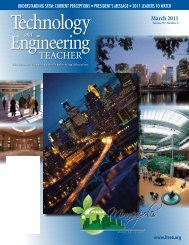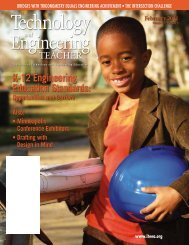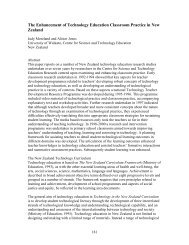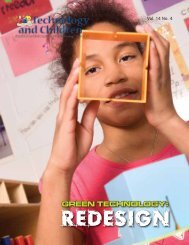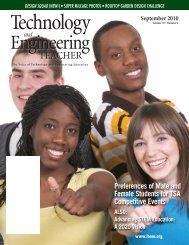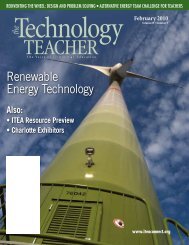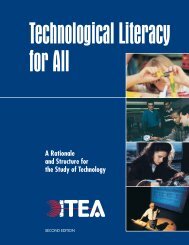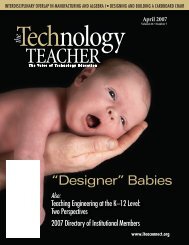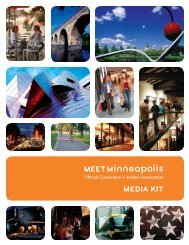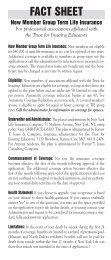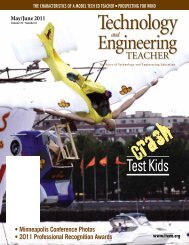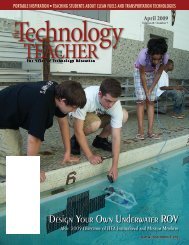Teaching Elements and Principles of Bridge Design - International ...
Teaching Elements and Principles of Bridge Design - International ...
Teaching Elements and Principles of Bridge Design - International ...
Create successful ePaper yourself
Turn your PDF publications into a flip-book with our unique Google optimized e-Paper software.
FEATURE ARTICLE<br />
execution. Inherent in this paradigm<br />
are powerful learning activities that<br />
the modern tech ed teacher should<br />
be capable <strong>of</strong> articulating in the<br />
classroom. Students should be<br />
challenged to evaluate <strong>and</strong> debate<br />
the environmental pros <strong>and</strong> cons <strong>of</strong> a<br />
variety <strong>of</strong> technologies. Here are<br />
some representative technologies a<br />
tech ed teacher should be well<br />
versed in <strong>and</strong> prepared to discuss<br />
<strong>and</strong> stimulate debate around:<br />
• Trains <strong>and</strong> rail transportation<br />
• The automobile<br />
• Electric power generation<br />
• Biotechnology<br />
• Micro miniaturization <strong>of</strong><br />
electronics/nanotechnology<br />
• Nuclear power<br />
• Solar energy<br />
Invention <strong>and</strong> Innovation: The<br />
Innovation Process<br />
The creation <strong>of</strong> new products <strong>and</strong><br />
services should be viewed <strong>and</strong><br />
respected for the multi-dimensional<br />
challenge <strong>and</strong> multi-disciplinary<br />
solution process that it is. I know <strong>of</strong><br />
no better way to naturally integrate<br />
the curricula than to have students<br />
engage in frequent, open-ended<br />
design challenges. Tech ed teachers<br />
should grasp that:<br />
• Innovation equals invention +<br />
market thrust.<br />
• Technical <strong>and</strong> non-technical<br />
aspects <strong>of</strong> a problem must be<br />
resolved <strong>and</strong> blended.<br />
• High quality questions tend to yield<br />
high quality, <strong>and</strong> more robust,<br />
solutions.<br />
• Planning a new product is as<br />
important as attempting to execute<br />
implementation.<br />
• Innovation is inherently an iterative<br />
activity.<br />
• An arsenal <strong>of</strong> creativity techniques<br />
can be used to generate possible<br />
solutions.<br />
• Out-<strong>of</strong>-the-box thinking is always in<br />
vogue.<br />
• The unique perspective <strong>of</strong>ten wins<br />
in the marketplace.<br />
• Innovation is a high-risk process,<br />
<strong>and</strong> failure is common.<br />
Intellectual Property<br />
In the globally competitive<br />
marketplace, what a company knows<br />
is as important as what it owns.<br />
Aspiring tech ed teachers should:<br />
• Know what patents are.<br />
• Be familiar with how inventors<br />
keep log books.<br />
• Have been involved in invention<br />
challenges in both team <strong>and</strong><br />
individual settings.<br />
• Know how to search patents on<br />
the Internet.<br />
• Be able identify both past <strong>and</strong><br />
current inventors <strong>and</strong> what they<br />
have accomplished.<br />
• Be aware <strong>of</strong> the economic value <strong>of</strong><br />
patents.<br />
Invention<br />
A tech ed teacher should be prepared<br />
to use the invention experience as a<br />
true curriculum integrator. Requests<br />
for invention related in-class talks<br />
<strong>and</strong> teacher in-service seminars has<br />
kept me busy for the last five years.<br />
It is a highly popular topic as it<br />
engages the head <strong>and</strong> h<strong>and</strong>s <strong>of</strong> the<br />
students <strong>and</strong> allows them to<br />
participate in open-ended, teambased,<br />
exercises. Aspiring tech ed<br />
teachers should:<br />
• Underst<strong>and</strong> how marketplace<br />
wishes for new products <strong>and</strong><br />
services jump-start the invention<br />
process.<br />
• Conduct exercises in class<br />
whereby student inventors learn<br />
how to compile their thinking in an<br />
inventor’s log book.<br />
• Appreciate how, along with the<br />
invention logbook, inventors<br />
compile their strategies about how<br />
to market their inventions.<br />
• How selecting <strong>and</strong> staffing the<br />
invention team is as important as<br />
creating the invention (here the<br />
teacher should be able to mix head<br />
<strong>and</strong> h<strong>and</strong> learners for maximum<br />
effect).<br />
• Be able to freely identify <strong>and</strong><br />
discuss famous U.S. inventors <strong>and</strong><br />
their accomplishments.<br />
• Document the growth <strong>of</strong> various<br />
technologies that have had a major<br />
influence on American life (light<br />
bulb, electronic circuit<br />
miniaturization, personal<br />
computer...etc.).<br />
• Use timelines to show how various<br />
inventions influenced each other<br />
<strong>and</strong> other segments <strong>of</strong> society.<br />
Technical Career Considerations<br />
Skill Sets For Success<br />
There are definable skill sets for<br />
success in the twenty-first century<br />
workplace. Most <strong>of</strong> them are directly<br />
related to the seismic shift away<br />
from a machine to an information<br />
economy, one where great value is<br />
placed upon higher-order thinking<br />
skills. A competent tech ed teacher<br />
should be able to take the key skills<br />
listed below <strong>and</strong> relate them back to<br />
work being done in the classroom on<br />
a daily basis:<br />
• The ability to connect <strong>and</strong><br />
interrelate subject matter<br />
• Good oral <strong>and</strong> written<br />
communication skills<br />
• Logical <strong>and</strong> intuitive analytical<br />
skills<br />
• Planning <strong>and</strong> organization skills<br />
• Interpersonal <strong>and</strong> team player skills<br />
• Being able to turn ideas into reality<br />
<strong>and</strong> to manage that process<br />
• Underst<strong>and</strong>ing markets <strong>and</strong> what<br />
customers want<br />
• The capability to learn <strong>and</strong> re-learn<br />
effectively <strong>and</strong> efficiently<br />
The Benefits <strong>of</strong> a Technical<br />
Career<br />
Tech ed students, like all others,<br />
require career guidance. The tech ed<br />
teacher should be able to articulate<br />
the benefits <strong>of</strong> a technical career <strong>and</strong><br />
relate them back to classroom<br />
activities. Specifically, the tech ed<br />
teacher should be able to discuss<br />
how a technical career path:<br />
• Relates to other careers.<br />
• Influences starting <strong>and</strong> long-term<br />
average salaries.<br />
• Requires life-long learning.<br />
The tech ed teacher should also be<br />
able to present:<br />
• Examples <strong>of</strong> well-known Americans<br />
who have pursued technical<br />
careers.<br />
38 April 2005 • THE TECHNOLOGY TEACHER



